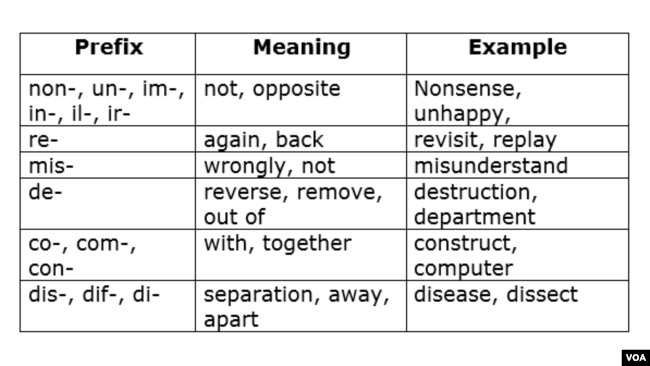Prefixes
Let's start with prefixes.
A prefix is a letter or a group of letters that we add to the beginning of a word. Prefixes change the meanings of words. For example, the prefix un- (or u-n) can mean "not," "remove," or "opposite." Adding un- to the word "happy" gives you the word "unhappy," which means not happy.
U-n and r-e (or re-) are the two most common prefixes in the English language. Re-means "again" or "back," such as in the words "rethink" "redo" and "repay."

Here are a few things to remember when learning prefixes:
- Different prefixes in English can have similar meanings, such as un-, in- and non- all of which mean "not" or "opposite of." Also, the prefixes mis- and ir-mean "wrong," "wrongly," or "incorrectly."
- Notice that double letters are possible. For example, when you add the prefix im- to words that begin with the letter "m," you get two "m"s as in "immeasurable." That's also true when you add un- to words that begin with the letter "n," as in "unnoticeable." The same is true for many other prefixes.
- When adding a prefix to a word, the spelling of the base word never changes. For example, the prefix un- did not change the spelling of the word "happy." And, the prefix re- would not change the spelling of the word "live" in "relive."
- Watch out for "lookalikes" – words that look like they contain prefixes but, in fact, do not. For example, the un- in the word "uncle" is not a prefix, nor is the re- in the words "reach" or "real."
Suffixes
Now, let's turn to suffixes.
A suffix is a letter or group of letters added to the end of a word. Suffixes are commonly used to show the part of speech of a word. For example, adding "ion" to the verb "act" gives us "action," the noun form of the word. Suffixes also tell us the verb tense of words or whether the words are plural or singular.
Some common suffixes are -er, -s, -es, -ed, -ing and -ly.
Here are a few things to remember when learning suffixes:
- Some suffixes have more than one meaning. For example, the suffix -er may suggest a person who performs an action, like a teacher. But "er" is also commonly added to the ends of adjectives and adverbs. They compare two things and show that one is "more" than the other, such as in "faster" and "stronger."
- The spelling of a base word can change when a suffix is added. This is true of most base words ending in the letter "y." For instance, when we add the suffix -ness to the word "crazy" to make "craziness," we replace the "y" with an "i." This rule is also true of many base words ending in a silent "e" when the suffix begins with a vowel. For example, in the words "write," "make" and "manage," we drop the "e" in the words when we add -ing to make: "writing," "making" and "managing." We also often drop the silent "e" before the suffix -able such as in "usable." Be careful, though, because with some words, we keep the "e," such as in "changeable" and "loveable."

There are additional suffix rules, but they deal with spelling and can be learned with time and practice.
A thing to keep in mind about both prefixes and suffixes is that some are only used with some words. For example, we add the suffix -ful to some nouns to mean "full of," such as in the words "beautiful" or "helpful." But, we cannot add -ful to just any noun. You could not, for example, say "loveful" to mean full of love.
So, what are some ways that you can practice common prefixes and suffixes?
One way is to use online flashcards from websites like Quizlet. You can choose sets of cards that are already made or create and use your own sets. Or, you can make your own flashcards with pieces of paper.
Once you've spent time practicing, take a news story or page in a book and look for words that have the prefixes and suffixes you learned. Then, use what you know about the meaning of the root words to guess the meanings of those words.
Learning prefixes and suffixes will not only build your vocabulary but can make unfamiliar English words a lot less frightening.
| 
















